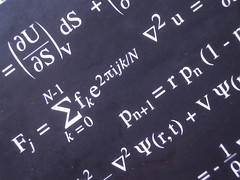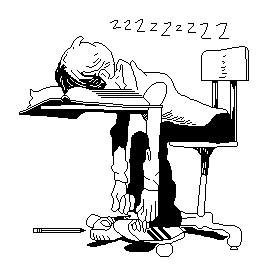 |
An old friend of mine, who went into teaching chemistry at high school, was surprised that I am involved in mathematics research, or more correctly that anyone is. |
Paraphrasing what he said:
Surely all mathematics was worked out and finalised years ago?
I think he was willing to accept that there are still some classical open problems, but essentially he thought that mathematics was now ‘done and dusted’.
Of course this cannot be the case, as evidence I offer all the preprints that appear on the arXiv everyday. Mathematics departments are not full of people who just teach linear algebra and calculus to engineering students! I also submit that my boss Prof. Grabowski would be wondering what I am doing day in day out!
But why would he think mathematics research is over?
High School Mathematics
I think this belief stems from mathematics teaching in schools. Let me explain…
Let us start with physics and science in general. Students and the public at large know that scientists are working on open problems and discovering new things. For example we hear about new materials (eg. graphene); we know that the likes of Hawking are wrestling with the theory of black holes; we see images of all kinds of things in observational cosmology; we hear about medical scientists working on cancer cures; biologist discovering new species can make the news; CERN discovered the higgs boson…
High school students are aware that science is far from over and the syllabus for A-level physics is periodically updated to reflect some of these new discoveries.
But what about mathematics?
Linear algebra first emerged in 1693 with the work of Leibniz. By about 1900 all the main ingredients were know, so vectors have a modern treatment by 1900. This is all quite dated, but some open questions remain (for example in relation to quantum information theory).
Quadratic functions were solved by Euclid (circa 300 BC) and ‘the formula’ was known to Brahmagupta by 628 AD.
Calculus the foundations are from the 17th century in the works of Newton and Leibniz.
Plane geometry goes back to 300 BC and Euclid. Coordinate geometry is due to Descartes in the 1600’s.
Probability theory has it origins in Cardano’s work in the 16th century. Fermat and Pascal in the 17th century also made fundamental advances here.
Logarithms and exponentials in their modern form is due to Euler in the 18th century.
Trigonometry has roots going back to the Greek mathematicians from the 3rd century BC. Islamic mathematicians by the 10th century were using all six trigonometric functions.
So in sort, much of the typical pure mathematics syllabus at advanced level in high school is quite old. This I think, together with the ‘unchanging’ nature of mathematics (once proven a statement is always true) leads to the idea that it is all done already and nothing new can be discovered.
It also take from my friends question that he understood that the applications of mathematics are important and that plenty of work in applied mathematics is going on, for example in computational approaches to chemical dynamics. However, the ideas that mathematics as mathematics is finished remained.
For me personally, these applications of mathematics can lead to new structures in mathematics and this is worth studying. Indeed much of my professional work is in studying geometries inspired by applications in physics, particularly mechanics and field theory.
What can be done?
The ‘unchanging’ nature of mathematics is hard to get around. In science some new evidence could come to light and change our views. Indeed the scientific method is an integral part of teaching physics at advanced level in the UK. This ‘flexibility’ of science to adapt is important in student understanding of the philosophy of science.
So, we could try to promote new discoveries in mathematics to the general public, including high school students. The problem is that the background needed to understand the questions, let alone have any idea about the solutions prevents wide public engagement. Astronomers are lucky, we have all seen stars in the sky and can admire nice pictures!
Trying to start at a much higher level of mathematics would be futile, given the prerequisites that are needed. Moreover, most students will not become researchers in mathematics and will only need to be comfortable applying basic mathematics to their later field of study and work.
In short I have no idea how to promote the idea that mathematics research is not over, but please take my word it is not over!







